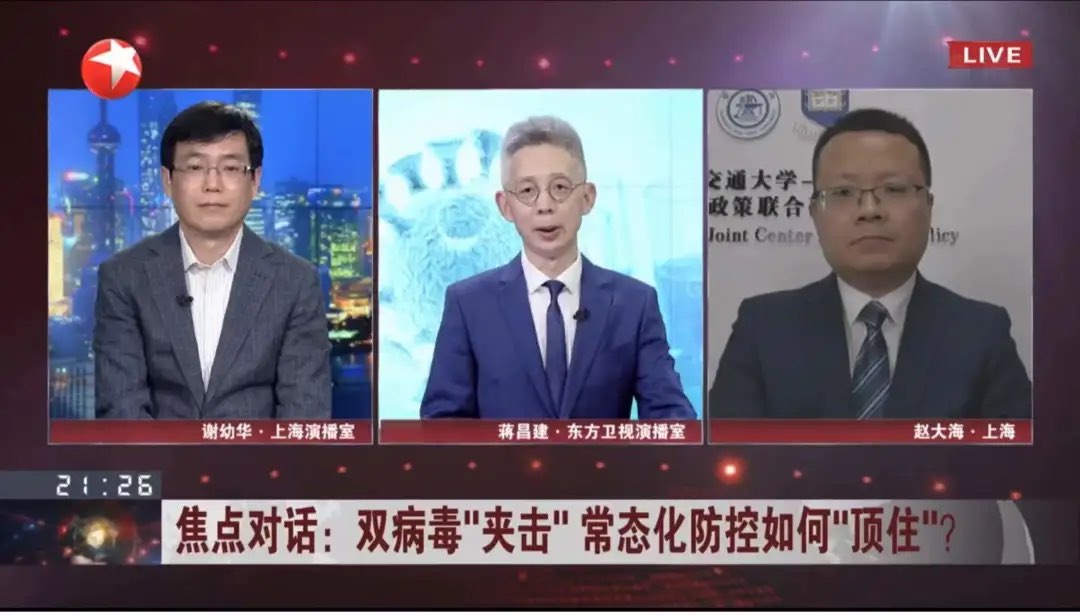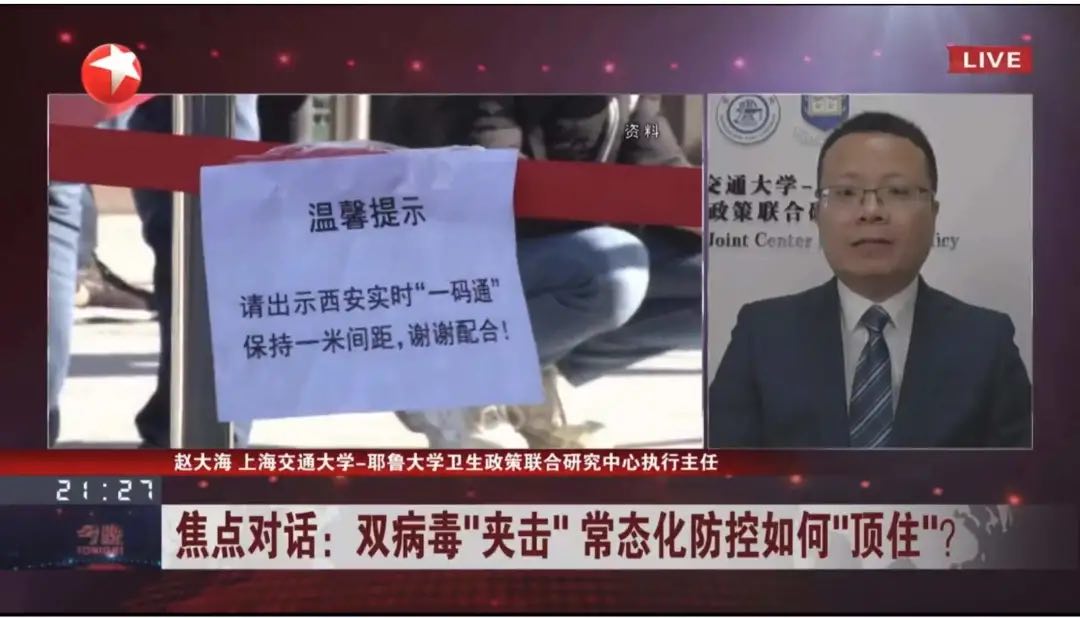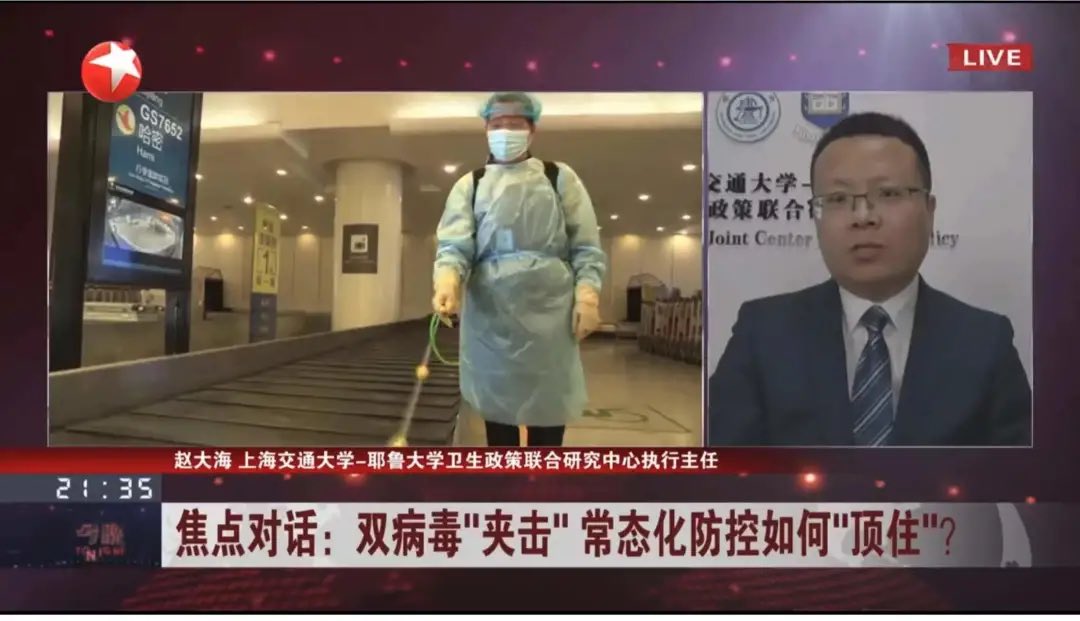上海交大赵大海接受东方卫视专访:全民核酸检测是西安应对本轮新冠暴发的科学策略

上海交通大学国际与公共事务学院教授、博士生导师,上海交通大学-耶鲁大学卫生政策联合研究中心执行主任赵大海,自新冠肺炎疫情暴发以来,对于新冠疫情暴发、防控以及卫生政策第48次接受上海电视台专访,也是第114次接受央视、上视专访。2021年12月21日,赵大海接受东方卫视专访,就西安市的本轮新冠疫情暴发以及应对奥密克戎新毒株等话题进行了解释和评论。同期嘉宾是上海市重大传染病和生物安全研究院副院长谢幼华。现仅将有关赵大海的访谈内容摘录如下。

主持人蒋昌建:值得注意的是,目前西安公布了三条传播链,包括隔离酒店、门诊和长安大学,但是传播途径仍然不清晰,流调在各个传播链之间也缺少明确的关联性,这会给疫情防控带来哪些困难?
赵大海:西安的本轮新冠疫情局部散在暴发,确实存在传播链不太清晰,而且出现了一定的社区传播,给疫情防控带来了一些困难。在这些困难当中,最大的困难就是,想在最短的时间内,通过流调的方式找到所有的新冠确诊患者及其所有的密切接触者,难度很大。与此同时,西安市在12月18日进行了全市的全民核酸检测;接下来,之后还会有第二轮,甚至第三轮的全市全民核酸检测。应该讲,对于传播链较多,传播链不太清晰,出现社区传播的新冠疫情暴发,通过全民核酸检测的办法,可以克服疫情带来的上述困难,是比较可行的办法。

蒋昌建:在国内尚未出现大规模奥密克戎传播的情况下,守住国门,我们该做些什么?
赵大海:无论是应对奥密克戎新毒株还是德尔塔毒株,严防境外输入,依然是我国新冠疫情防控的最主要任务。至于防控的办法和措施,通过近两年的疫情防控,各地均已具备了成熟的机制和经验,比如接种第三针的新冠疫苗等,无需多讲。全国各地,尤其是与境外直接航空、航运关联的大城市,以及各边境地区,要继续高度重视、严格执行严防境外输入的各项规章制度,不能松懈,不能掉以轻心。只要各地严格执行已有的各项疫情防控政策,持续执行严格外防输入、内防反弹的政策,中国就一定不会出现较大规模的新冠暴发。
供稿者:国务学院
日期:2021年12月22日
Dahai ZHAO’s Exclusive Interview with ShanghaiTV: All-inclusive testing is the science-based strategy to the new round of rising COVID in Xi’an
Dahai Zhao, a doctoral supervisor at SJTU School of International and Public Affairs, the Executive Director of YALE-SJTU Joint Research Center for Health Policy, has been interviewed by ShanghaiTV for the 48th time (114times by CGTN / ShanghaiTV altogether) since the COVID-19 pandemic. On 21 November, Zhao commented on the containment of Omicron in Xi’an on Shanghai TV.
Moderate: It is worth noting that three chains of transmission have been announced in Xi’an, including hotels for quarantine, outpatient clinics and Chang’an University. But the transmission route remains unclear. There is also a lack of clear correlation between the three chains. What difficulties will this bring to epidemic prevention and control?
ZHAO: The current outbreak of COVID-19 in Xi’an has been sporadic, with unclear transmission chains and the community spread, which has brought some difficulties to COVID prevention and control. Among these difficulties, the most is to find all COVID-19 cases and the close contacts in the shortest possible time through epidemiological survey. Meanwhile, Xi’an conducted nucleic acid tests for its entire population on December 18. And then, after that, there will be a second, maybe a third round of nucleic acid testing for all of the people in the city. It should be said that, for COVID-19 outbreaks with many transmission chains which remains unclear accompany with community spread, nucleic acid testing for the all population should be the relatively feasible approach.
Moderate: What should we do to guard our country when there have been no large-scale omicron transmission at home?
ZHAO: Whether it is the Omicron strain or the Delta strain, preventing import cases from abroad remains the most important task for China's COVID-19 prevention and control. As for the specific methods and measures, all localities have developed mature mechanisms and experience through the past two years containments, such as the third dose of COVID-19 vaccine. All parts of the country, especially big cities connected with overseas direct aviation and shipping, as well as border areas, should continue to attach great importance to and strictly implement all rules and regulations on the prevention of overseas imports. They should not be relaxed or taken lightly. As long as local governments strictly implement existing epidemic prevention and control policies and continue to strictly prevent imported cases and domestic rebound, there will be no large-scale outbreak of COVID-19 in China.
Contributor: SIPA, SJTU
Date: December 22, 2021

